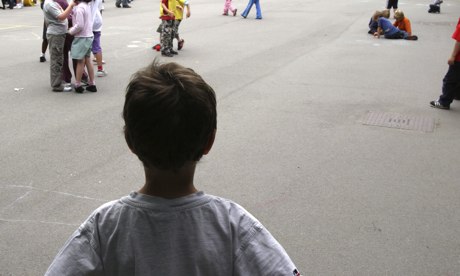Children Still at Risk of Abuse in Schools, Clubs and Care Homes, Report Warns
The Guardian
Children in institutions such as schools, churches and care homes are still not safe from abuse, child protection experts have warned in a new report. More has to be done to keep children in institutions including sports clubs, youth groups and charities safe, the report published on Thursday by the National Crime Agency (NCA) warns. The report, called The Foundations of Abuse, found that children are not only at risk from abusers but from "bystanders" who are aware of abuse but fail to report it. And it warned that child sex offenders often manipulate victims into believing the attention they get is an "honour", making it hard for them to report abuse. The report, carried out by the NCA's Child Exploitation and Online Protection (CEOP) Command, is the first "thematic assessment" published by the agency since it was launched three weeks ago and looked at the risk of child sexual abuse by adults in institutions. As part of the study, institutions were categorised into three strands: education and pastoral; residential and care; and corporate and religious, with contributors including the NSPCC, the Office for the Children's Commissioner (England), the Church of England, and Operation Yewtree, the national investigation sparked by abuse allegations against Jimmy Savile. Experts analysed literature, consulted safeguarding practitioners and looked at a number of case studies involving abusers including religious leaders, a youth group worker, the head of a care home, a sports coach, a media personality, and a nursery worker. The report's key findings showed that children in institutional settings are not only at risk from abusers but from adults who fail to notice abuse or, if they do, fail to report it. It warned that management structures can discourage junior staff from reporting suspicions, and can also allow offenders to gain the trust of their victims and those who should be protecting them. In many of the case studies, offenders groomed victims by offering rewards or privilege and the report highlights how, particularly in religious settings, victims and those around them are "often in awe of offenders, considering the attention paid to them as an honour". Victims in some cases were made to feel indebted to their abusers, making them feel that they were somehow complicit, experts found. The report said in some cases, protecting the organisation's reputation had taken precedence over reporting abuse, and workers' loyalty to the institution also stopped them from reporting concerns. Experts found that some victims of abuse lacked access to primary carers, some were those who were less likely to be believed, but some showed no apparent vulnerabilities. According to the report, there could be a "false perception" that institutional child sexual abuse no longer happened, because of the historic nature of cases and developments in safeguarding. Peter Davies, director of the NCA's CEOP Command, said: "The sexual exploitation and abuse of children is most likely when vulnerability meets power. "Events of the last year have brought into focus an issue which has, in truth, been in our consciousness for much longer - that there is something about institutions that can amplify both vulnerability and power to a point where sexual abuse of children within them can become endemic. "A common position for those institutions confronted with their past failures is to admit that things did once go wrong but that they have put measures in place to stop it happening again. "There is a risk this will lead to complacency and this must not happen if we want to protect our children. "There is no doubt that more needs to be done - and this work has to be done by the very institutions which are allowing this abuse to take place. Vigilance, strong leadership and management, and a safe environment to report are essential for institutions and form the foundations of safeguarding." Writing in the report, Mr Davies added: "We must not assume that all the lessons have been learned, that it could never happen now or here; protecting the most vulnerable from the worst abuse is always current, urgent and important." The report comes just days after a study published by the Office of the Children's Commissioner for England said it was down to teachers, social workers and other professionals to notice the signs and symptoms of mistreatment rather than wait for a child to talk about it. Children's Commissioner Dr Maggie Atkinson said too many children were still suffering at the hand of adults and too many of the adults they came into contact with were failing in their duty to protect them. The NCA report outlines eight key recommendations for institutions. They include putting children's interests first; creating a safe environment for reporting; effectively implementing and monitoring safeguarding policies; improving protection through safer recruitment; and releasing alleged offenders' identities.
|
.
Any original material on these pages is copyright © BishopAccountability.org 2004. Reproduce freely with attribution.
